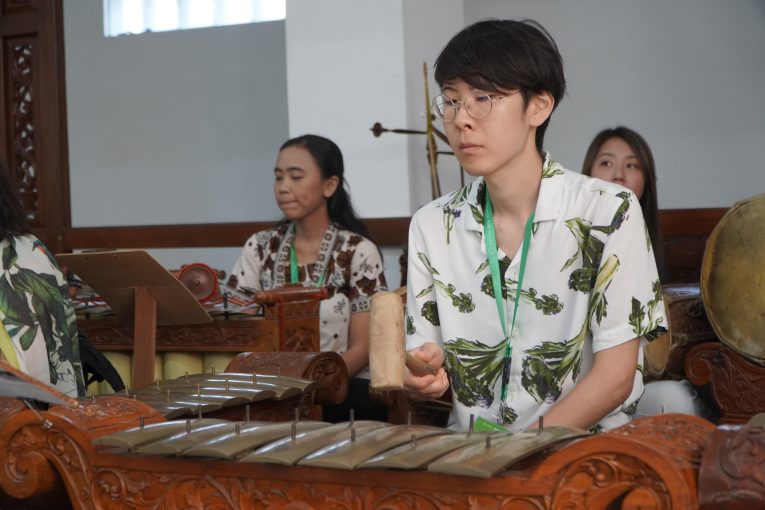
Dozens of researchers, lecturers, and students from various countries gathered to play gamelan at the Faculty of Philosophy, Universitas Gadjah Mada, on Tuesday (9/7). Enthusiastically, they struck the kendhang, saron, bonang, and gong under the guidance of their instructor. These participants were attendees of the 2024 AAS-in-Asia Conference, organized by the Association for Asian Studies in collaboration with Universitas Gadjah Mada.
“This is my first time playing gamelan, and it’s such an enjoyable experience. I had a great instructor who made it easy to follow, and I’m now interested in learning more in the future,” said Mark Iñigo Tallara, a participant from De La Salle University, Philippines.
The gamelan workshop was held in two sessions. The first session, starting at 10:00 AM, was attended by 16 participants, while the second session, beginning at 1:30 PM, involved more than 20 participants. Due to the limited number of instruments, attendees took turns playing.
Each session featured different songs. Participants in the first session learned Lancaran Gugur Gunung, while those in the second session practiced Suwe Ora Jamu.
Like Mark, for most participants, this was their first time playing gamelan. However, some attendees had prior experience with gamelan and Javanese tembang (traditional songs). A few were even part of gamelan ensembles or instructors in their respective countries.
One standout participant was Ilaria Meloni, an academic from La Sapienza University of Rome, Italy, who skillfully sang tembang accompanied by the gamelan. She had studied gamelan and Javanese tembang during her time at the Yogyakarta Institute of the Arts and continues to pursue this art form actively.
“I still play gamelan whenever I have the chance to visit Indonesia. It’s wonderful to see colleagues from different countries experiencing gamelan for the first time. Many feel apprehensive at first since they’re unfamiliar with the instruments, but once they start learning, they truly enjoy it,” she shared.
The AAS-in-Asia Conference, held from July 9 to 11, serves as a platform for academics specializing in Asian studies to exchange ideas and build networks. The Gamelan Workshop is a special feature of the conference, designed to provide participants with a unique and valuable cultural experience.
“Our aim is to ensure participants have an enjoyable time in Indonesia. Many of them are already familiar with the country, so they are eager to explore Indonesia’s traditional arts, such as gamelan,” explained Rona Utami, S.Fil., M.A., a member of the organizing committee.
In addition to the gamelan workshop, the Faculty of Philosophy will host a Calligraphy Workshop featuring Javanese, Arabic, Chinese, and Korean scripts on Wednesday (10/7), the second day of the AAS-in-Asia Conference. This workshop will include discussions and hands-on training led by calligraphy experts and practitioners from various countries, open to all conference attendees.
